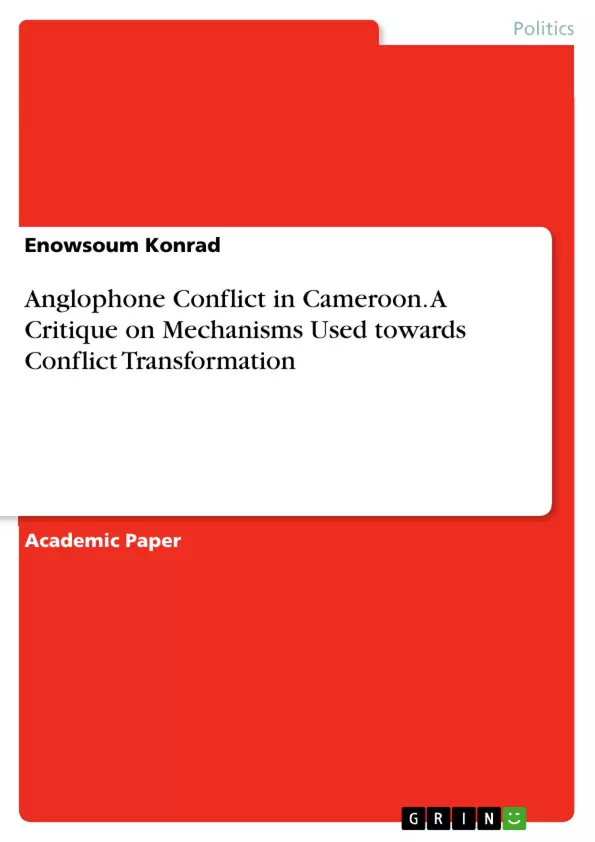The rationale for this paper is to get into the lens of what is the Anglophone conflict- a conflict situation that has gripped the North West and South West Regions of Cameroon. Following the escalation of what started as merely civil protests from the educational and common law lawyers professions for better working conditions and respecting the Anglophone educational and legal identity saw a twist of events in 2018. With the escalation of the crisis to a conflict, the government and her development partners have sought a wide range of measures as step towards resolving the ongoing. It is the place of this academic paper to peruse through the measures put in place so far. In this therefore the paper had adopted a qualitative method of analysis of data obtained through semi-structured interviews while corroborating with the Pyramid Model of Conflict transformation as framework for analysis. The findings of this show that government resolution mechanisms have come as a result of the Major National Dialogue and the themes that surrounded this dialogue. The paper takes note of the dwindling nature of the ongoing conflict following these measures implemented so far as it can be viewed have not really yielded the much expected results. It is in this light that the paper has put forth the following recommendations like; building meaningful relationship with the civil society stakeholders, introduce the culture of civilian-military relations
Inhaltsverzeichnis (Table of Contents)
- Introduction
- Statement of Problem
- The Mechanisms implemented to promote Conflict Transformation
- Political Mechanisms
- The Major National Dialogue (MND)
- Special Status
Zielsetzung und Themenschwerpunkte (Objectives and Key Themes)
The aim of this paper is to analyze the Anglophone conflict in Cameroon and the mechanisms used for conflict transformation. The paper examines government initiatives and their effectiveness in addressing the conflict's causes and achieving lasting peace.
- The historical context of the Anglophone conflict in Cameroon.
- The various mechanisms implemented by the government for conflict transformation.
- The effectiveness of these mechanisms in achieving peace and reconciliation.
- The role of civil society and development partners in conflict resolution.
- Recommendations for future conflict transformation strategies in Cameroon.
Zusammenfassung der Kapitel (Chapter Summaries)
- Introduction: The paper introduces the Anglophone conflict in Cameroon, highlighting its historical background and evolution. It discusses the challenges of achieving lasting peace and the importance of conflict transformation.
- Statement of Problem: This section presents a comprehensive analysis of the conflict's root causes and the escalation of violence in the North West and South West regions. It highlights the government's response to the crisis.
- The Mechanisms implemented to promote Conflict Transformation: This section focuses on the various measures taken by the government to address the Anglophone conflict. It examines the political, economic, and social strategies employed. The paper explores the effectiveness of these measures and their impact on the conflict's trajectory.
- Political Mechanisms: This subsection examines the government's political strategies in addressing the conflict, including the Major National Dialogue (MND) and the granting of Special Status to the North West and South West regions. It discusses the potential impact of these mechanisms on the conflict.
- The Major National Dialogue (MND): The chapter provides a detailed analysis of the MND, exploring its objectives, participants, and outcomes. It evaluates the dialogue's effectiveness in achieving reconciliation and peace.
- Special Status: The paper explores the granting of Special Status to the North West and South West regions as a conflict transformation measure. It discusses the provisions of this status, its implementation, and its potential impact on the conflict dynamics.
Schlüsselwörter (Keywords)
This paper examines the Anglophone conflict in Cameroon, focusing on conflict transformation, mechanisms, political reforms, Major National Dialogue, Special Status, and civil society engagement. It delves into the effectiveness of these strategies in achieving lasting peace and reconciliation.
Frequently Asked Questions
What is the Anglophone conflict in Cameroon?
It is a conflict in the North West and South West regions of Cameroon that escalated from civil protests regarding educational and legal identity into a significant crisis.
What is the focus of this academic paper?
The paper peruses the mechanisms implemented by the government and development partners to transform and resolve the conflict.
What is the Major National Dialogue (MND)?
The MND was a key government initiative aimed at addressing the crisis through themes of reconciliation and political reform.
What does "Special Status" refer to in this context?
It refers to the specific political and administrative status granted to the North West and South West regions as a conflict transformation measure.
What methodology was used for the analysis?
The study adopted a qualitative method using semi-structured interviews corroborated by the Pyramid Model of Conflict Transformation.
What are the paper's recommendations?
Recommendations include building meaningful relationships with civil society and introducing a culture of civilian-military relations.
- Quote paper
- Enowsoum Konrad (Author), 2023, Anglophone Conflict in Cameroon. A Critique on Mechanisms Used towards Conflict Transformation, Munich, GRIN Verlag, https://www.hausarbeiten.de/document/1403586


